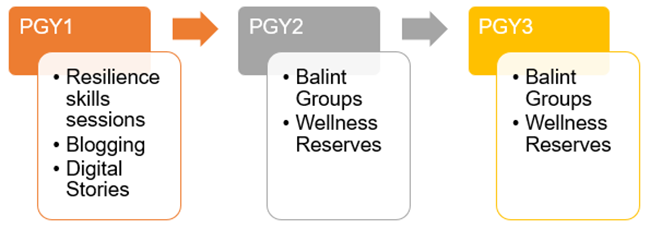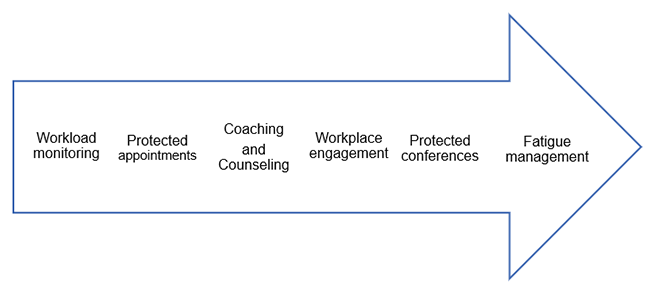Training Overview: Resilience

We believe that supporting the development of the resilient physician is a critical aspect of training the internist of the future. Our commitment to wellbeing and resilience stems from our core values and resilience is integrated into most of the program structure. Additionally, we recognize the value of having designated time for fostering wellbeing and thus have dedicated training in resilience into our curriculum. Our focus on resilience includes:
- Wellness programs for our trainees
- Resiliency skill training
- Training the reflective practitioner
- Providing time and space for resilience and reflection activities
- Health system support for wellness, resilience, reflection, referrals
- Transparency around topics of wellness, resilience, reflection, burnout, fatigue, stress, support
- Structures in training that support wellness, work life integration, reduce stress/fatigue
Wellness Programs
The Wellness Committee
The Wellness Committee is a committee developed by residents with the support of chief residents and program directors. It is comprised of housestaff from all post-graduate years as well as two to three faculty mentors. The committee has both educational and social activities promoting physician wellbeing. Examples of activities include organized walks along the Buttermilk Trail, Wellness Bingo competitions for resident teams, group runs, ice skating, yoga classes, making Valentine’s Day cards for team members and patients, and more!
Retreats
Retreats offer the opportunity for reflection, team-building, teaching, and leadership skills in a setting removed from the clinical environment.
Health System Programs
- The VCU GME office offers a number of resources for all trainees in the health system. More information can be found on the GME website.
- The VCU Health Wellness Task Force supports and coordinates health system-wide efforts to support the wellbeing of team members. The first annual VCU Health “Wellness in Action” Conference was hosted in fall 2019.
- HelpLink Employee Assistance Program (EAP) is a benefit offered to residents with up to five visits per year available at no cost. Counselors assist residents managing health, wellness, stress and other personal and job-related stressors. Our program frequently refers residents to EAP and provides protection for making appointment (VCUHS HelpLink: 828-4EAP)
- Residents are privy to the fantastic benefits offered to VCU employees, including medical, ophthalmology, dental and easy access to specialists at VCU. Other benefits include disability and leave, childcare, and tuition reimbursement. Information regarding employee benefits can be found on the GME website.
- All residents can join VCU Recreational Sports for a nominal payroll deduction and have access to all VCU facilities (https://recwell.vcu.edu/memberships/).
- The VCU Housestaff lounge allows for 24 access to workout equipment as well as a kitchenette and television.
- Watson Rooms exist on most floors in the hospital – providing a quiet area where all staff can go to decompress in their immediate work environment.
- Volunteer dogs (Dogs-on-Call) not only visit patients in the hospital, but love bringing joy to staff members as well and will make trips to resident team rooms by request!
Resiliency Skills Training
All of the core values contribute to the development of the resilient physician, including:
- Transparency around topics of wellness, resilience, reflection, burnout, fatigue, and stress
- Teamwork and flexibility to maintain balance for individuals
- Innovation within the curriculum.
The structure of our program allows us to incorporate and fosters resilience in our trainees while in the clinical environment, engaging in academic requirements, and working one-on-one with faculty.
Coaching: Program leadership, core faculty, and chief residents employ coaching methods to help our residents develop habits to promote and maintain wellness and resilience. Coaching topics include personal wellness and prioritization of responsibilities. Additionally, the program builds schedules and conferences to support resident success in finding balance between academic and clinical responsibilities at work.
Curriculum: We have dedicated training in resilience skills, reflection, and fostering the patient-clinician relationship into our curriculum. We use systematic, root cause analysis to help trainees process stressful clinical events and medical error in various components of the curriculum, including resilience skills training, Morbidity Mortality & Improvement conference, and the QI rotation. Our program and institution prioritize ensuring patient safety and event reporting in a non-punitive environment.
Advisors: Core advisors guide and support residents in advancing across milestones based on the individual learner. This method promotes the success of all trainees in the face of challenges, which helps build professional resilience. Advisors review self-assessments of burnout and wellbeing which is completed by the learner and aid in monitoring duty hours.
The Reflective Practitioner
 All residents develop their skills in reflecting on, in, and for action. Our program believes that the practice of reflecting builds resilience, thus decreasing burnout, fatigue, anxiety and stress. We believe in supporting the development of the resilient physician. All interns engage in a year-long resilience curriculum comprised of monthly small and large group “diastole” sessions to learn micro-skills for developing resiliency and complete corresponding blog assignments. Additionally, categorical and combined program interns participate in a four week-long reflection curriculum which is embedded into their Ambulatory rotation. During weekly sessions, interns practice various modes of purposeful reflection and create a digital story. Senior residents participate in monthly Balint groups, which are led by Balint-trained faculty members and foster building the doctor-patient relationship.
All residents develop their skills in reflecting on, in, and for action. Our program believes that the practice of reflecting builds resilience, thus decreasing burnout, fatigue, anxiety and stress. We believe in supporting the development of the resilient physician. All interns engage in a year-long resilience curriculum comprised of monthly small and large group “diastole” sessions to learn micro-skills for developing resiliency and complete corresponding blog assignments. Additionally, categorical and combined program interns participate in a four week-long reflection curriculum which is embedded into their Ambulatory rotation. During weekly sessions, interns practice various modes of purposeful reflection and create a digital story. Senior residents participate in monthly Balint groups, which are led by Balint-trained faculty members and foster building the doctor-patient relationship.
All residents participate in the following programs:
- Monthly training sessions in the first year in “reflection and resilience”
- Creation of a digital story, an innovative, high-tech approach to bringing a story or experience to life.
- Balint groups
- Regular self-assessment with coaching
- Critical incident reviews

